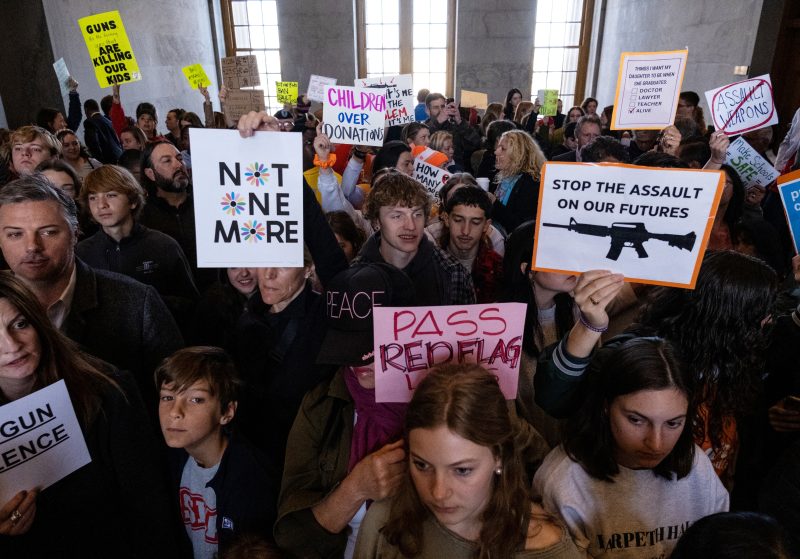
Republicans called Tennessee an ‘insurrection.’ It’s not the first time they’ve misused the term.
On the morning of March 30, hundreds of protesters marched into the Tennessee Capitol calling for gun control legislation after a shooter killed six people, including three children, at a Nashville Christian school.
When three state lawmakers interrupted debate over an education bill to lead demonstrators gathered in the chambers’ galleries in chants, House Speaker Cameron Sexton (R) recessed the body for just under an hour and ordered security to clear the assembly. The protesters, who were largely parents and students, committed no violence and no arrests or property damage took place at the Capitol, according to the Tennessee Department of Safety and Homeland Security.
But during an interview with a local radio station that evening, Sexton compared the actions of two of the lawmakers to Jan. 6 rioters, saying their behavior was “at least equivalent, maybe worse depending on how you look at it, of doing an insurrection in the Capitol.”
Experts say the comparison is misguided and inaccurate. But the comments, which were echoed by others on the right such as Fox News host Tucker Carlson, fit an evolving pattern of Republicans accusing Democrats of “insurrection” even when the label doesn’t apply.
On Jan. 6, 2021, a violent mob incited by then-president Donald Trump stormed and ransacked the U.S. Capitol in a bid to overturn the certification of Joe Biden’s win in the 2020 presidential election. Proceedings were disrupted as lawmakers were evacuated to safety. Five people died as a direct result of the day’s events and four officers who responded to the attack later died by suicide. More than $2.7 million in property damage was sustained. Rioters outside the building erected gallows and chanted for the deaths of high-profile lawmakers, including House Speaker Nancy Pelosi (D) and Vice President Mike Pence (R). Self-described militia groups and violent extremists participated in a bid to overthrow the government. Nearly 1,000 people have been arrested in connection to the attack.
Since that day, many Republicans have downplayed the attack while assailing a range of activities with the “insurrection” moniker, even when there’s been no violence. Some examples have included:
In October 2021, Trump said in a statement that the “real” insurrection was the 2020 election itself, which he continues to falsely claim was stolen from him.In April 2022, Florida Republicans accused Democrats of “insurrection” after state lawmakers held an hour-long protest on the state House floor to object to a congressional redistricting map.In May 2022, Sen. Ted Cruz (R-Texas) called protesters outside the homes of Supreme Court justices “goons” and said that Democrats “believe in violence” and “mob rule.” He also said that “on Jan. 6 of 2021, you had tens of thousands of people peacefully protesting,” but that “the corporate media and Democrats slander them with the made-up term ‘insurrectionist.’”That same month, right-wing media personality Matt Walsh wrote on Twitter that the leaking of a draft Supreme Court opinion overturning its landmark Roe v. Wade decision “is an actual insurrection” and that “January 6th was a stroll in the park compared to this. It’s not even close.”In June 2022, Arizona Republicans praised the Arizona Department of Public Safety for dispersing a protest of several thousand people which GOP lawmakers called an “insurrection” at the state Supreme Court. Protesters, some of whom were banging on the court’s windows, were dispersed with tear gas, though the event was reportedly peaceful and no arrests were made.In July 2022, Rep. Andy Biggs (R-Ariz.), chairman of the House Freedom Caucus, joked on Fox News that an interruption of a House hearing by gun control activist David Hogg “is the definition of insurrection” and that “he should probably be brought up and charged. Where is that J-6 committee when you need them?”In February, Florida Gov. Ron DeSantis, when asked about a rule change at the Florida Capitol that requires a state agency to approve any protest, said the measure was likely meant to prevent “a heckler’s veto” and that protesters “from the left” are praised for “democracy in action. They don’t say it’s an insurrection if you take over a Capitol because of that.”
The trend reflects conservative grievances over condemnation of the Jan. 6 attack as well as resentment at the perceived persecution of right-wing causes and organizations, according to political analysts and academics.
Ari Fleischer, a Republican media consultant who served as press secretary to President George W. Bush, said “it’s about turning the tables.”
“There is a deep belief by conservatives that the deck is stacked against whatever they believe in and whatever they do, and that manifests in this battle over language,” he said. “It’s almost a battle cry and a taunt for conservatives to say ‘Tennessee is an insurrection, this is an insurrection, that is an insurrection.’ It’s a way to fight back from what they perceive were words that were used wrongly against them. In that sense, its an attempt to level the playing field.”
Using retaliatory language to describe political opponents “is completely consistent with the rhetoric that Republicans have been using since the first Trump presidential campaign,” said James Gardner, a professor who studies election law and political persuasion at the University of Buffalo.
Such comments from Republican lawmakers, Gardner said, often appeal to grievance, frustration and resentment among conservative voters. GOP politicians and activists, he said, use them to “paint themselves as victims, when they are in fact the ones doing the victimizing.”
